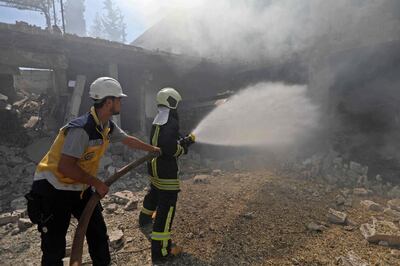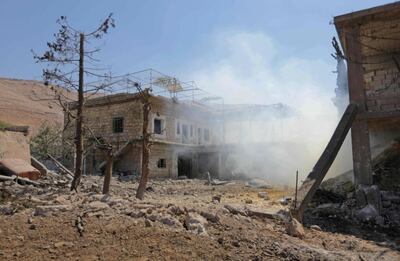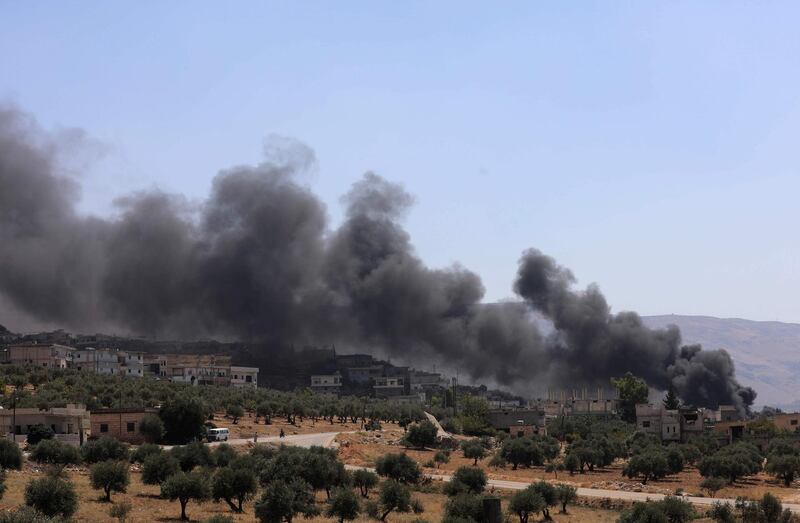Russian jets carried out air strikes against rebel targets in Idlib on Tuesday following a respite of several weeks, raising the prospect that a ground offensive to recapture the northwestern Syrian province may soon follow.
The strikes came just hours after US President Donald Trump issued a warning to his Syrian counterpart Bashar Al Assad not to “recklessly attack” the last rebel holdout in the country.
Mr Trump wrote on Twitter: “The Russians and Iranians would be making a grave humanitarian mistake to take part in this potential human tragedy. Hundreds of thousands of people could be killed. Don’t let that happen!”
At least five children were killed in the air strikes, which targeted an area near the town of Jisr al-Shughour, according to local monitors.

The renewed Russian bombardment significantly raises the stakes for talks between Turkey, Iran and Russia set to take place on Friday, which are aimed at finding an alternative to a large-scale offensive.
The UN’s Syria envoy Staffan de Mistura described those talks as “crucial” to avoiding an assault, and noted that media reports have suggested Damascus plans to launch an attack next week if a solution is not found.
Humanitarian organisations have warned of a potential catastrophe for the roughly 2.5 million civilians in the province should the attack go ahead.
But Syria and its allies have signalled that they intend to push ahead in Idlib, nearly two thirds of which is controlled by around 30,000 fighters belonging to the extremist Hayat Tahrir Al Sham (HTS), the Islamist coalition affiliated with Al Qaeda.

The Kremlin waved off Mr Trump’s warning on Tuesday, calling the enclave a “nest of terrorism”.
"Just to speak out with some warnings, without taking into account the very dangerous, negative potential for the whole situation in Syria, is probably not a full, comprehensive approach," Kremlin spokesman Dmitry Peskov Peskov said.
3 women were injured, after an aerial bombardment struck the small village #Pedershmu, in the western countryside of #Idlib. #WhiteHelmets quickly arrived on the scene to extinguish the resultant fires in the homes and transfer the wounded by ambulance. #Syria pic.twitter.com/cc9IvnmPc4
— The White Helmets (@SyriaCivilDef) September 4, 2018
Following a visit to Damascus the previous day, Iranian Foreign Minister Mohammad Javad Zarif described the situation as “sensitive,” but said the aim is for the “exit of terrorists from Idlib to be carried out with the least human cost”.
Analysts have speculated that Russia and Syria may pursue a phased offensive that would target strategic areas on the edges of the province first.
US officials, meanwhile, have been working behind the scenes to delay an attack.
A US delegation tasked to discuss Idlib arrived in the region on Saturday, and has visited Jordan, Israel and Turkey.
Turkey holds immense leverage in Idlib due to its support for rebel groups there.
The delegation includes James Jeffrey, newly appointed Special Representative for Syria Engagement, and Joel Rayburn, Near Eastern Affairs Deputy Assistant Secretary and special envoy for Syria.
_______________
Read more:
Idlib's ruling militant group finds itself alone as regime forces advance
US delegation heads to Middle East to discuss Syria and Iran
_______________
Nicholas Heras, a senior fellow at the Centre for New American Security, told The National that Mr Trump’s tweet “is telling Mr Assad to back off because the United States stands by Turkey”.
Mr Heras said: “Secretary Pompeo is making Syria a signature issue of his term as Secretary of State … his new Syria team is trying to help Turkey stand its ground in Idlib, to preserve leverage in western Syria to apply on to Russia, Iran and Mr Assad.”
But for that to happen, “Turkey needs top cover from the United States if it is going to stare down Assad and force Russia to take the Geneva process seriously”.
Mr Pompeo retweeted the US president’s remarks about Idlib.
But Faysal Itani, a senior fellow at the Atlantic Council, where he follows Syria, told The National US leverage is constrained in Syria and the battle for Idlib is no exception.
“Short of sustained military action and a high appetite for risk in Syria, the US can’t stop a regime takeover of Idlib,” he said. “We might be able to postpone it through a round of symbolic strikes … but not stop it.”
Last week, a US official told The Washington Post that “right now, our job is to help create quagmires [for Russia and the Syrian regime] until we get what we want”.
“This approach involves reassuring the three key US allies on Syria’s border – Israel, Turkey and Jordan – of continued American involvement.”





